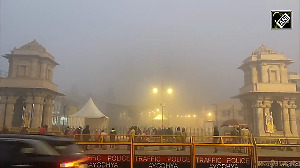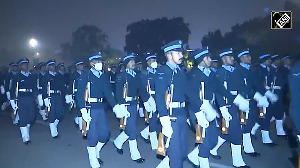Former Pakistan premier Benazir Bhutto was killed by the impact of a suicide blast and not by a gunshot, Britain's Scotland Yard said in its probe report, backing the Pakistan government's version of the assassination.
The report, handed over to interim Interior Minister Hamid Nawaz, an executive summary of which was released by the British High Commission, also concluded that a lone attacker fired shots at Bhutto and then detonated explosives at a rally in Rawalpindi on December 27.
"The only tenable cause for the rapidly fatal head injury in this case is that it occurred as the result of impact due to the effects of the bomb blast," United Kingdom Home Office pathologist, Dr Nathaniel Cary, was quoted in the report as saying.
"In essence, all the evidence indicates that one suspect fired the shots before detonating an improvised explosive device. At the time of the attack, this person was standing close to the rear of Bhutto's vehicle," the British detectives concluded.
"The blast caused a violent collision between her head and the escape hatch area of the vehicle, causing a severe and fatal head injury," said the report, signed by Detective Superintendent John MacBrayne.
Cary also said: In my opinion, Mohtarma Benazir Bhutto died as a result of a severe head injury sustained as a consequence of the bomb blast and due to head impact somewhere in the escape hatch of the vehicle."
"The limited X-ray material, the absence of a full post mortem examination and CT scan, have meant that Cary, who has been consulted in this case, is unable categorically to exclude the possibility of there being a gunshot wound to the upper trunk or neck," the report said.
However, when his findings are put alongside the accounts of those who had close contact with Bhutto's body, the available evidence suggests that there was no gunshot injury, the report said.
"Importantly, Dr Cary excludes the possibility of a bullet to the neck or upper trunk as being a relevant factor in the actual cause of death, when set against the nature and extent of her head injury," the report said.
The detectives, who were led by Macbrayne, also noted that "the task of establishing exactly what happened was complicated by the lack of an extended and detailed search of the crime scene, the absence of an autopsy, and the absence of recognised body recovery and victim identification processes."
The primary focus of the Scotland Yard team was to assist the Pakistani authorities in establishing the cause and circumstances of Bhutto's death.
The findings of the British team support the initial version of the Pakistan government, that Bhutto died due to a fatal wound when she hit her head on the lever of her bullet-proof vehicle, after the blast. This contention was rejected by Bhutto's Pakistan People's Party, which insisted that she died due to a gunshot injury.
A group of forensic, computer and explosives experts from the Counter-Terrorism Command of Britain's Metropolitan Police had come to Pakistan on January 4 after President Pervez Musharraf sought Scotland Yard's help to probe Bhutto's assassination.






 © 2025 Rediff.com -
© 2025 Rediff.com -